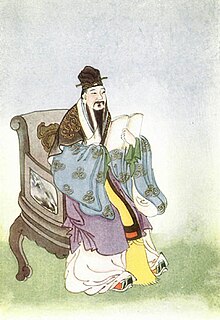About Confucianism:
Scholarly tradition and way of life propagated by Confucius in the 6th-5th century BC and followed by the Chinese for more than two millennia.*
Though not organized as a religion, it has deeply influenced East Asian spiritual and political life in a comparable manner. The core idea is ren ("humaneness," "benevolence"), signifying excellent character in accord with li (ritual norms), zhong (loyalty to one's true nature), shu (reciprocity), and xiao (filial piety). Together these constitute de (virtue).*
Mencius, Xunzi, and others sustained Confucianism, but it was not influential until Dong Zhongshu emerged in the 2nd century BC. Confucianism was then recognized as the Han state cult, and the Five Classics became the core of education. In spite of the influence of Taoism and Buddhism, Confucian ethics have had the strongest influence on the moral fabric of Chinese society.*
A revival of Confucian thought in the 11th century resulted in Neo-Confucianism, a major influence in Korea during the Choson dynasty and in Japan during the Edo period.*
Important Persons:
Confucius
Confucius (traditionally 551 BCE–479 BCE) was a famous thinker and social philosopher of China, whose teachings have deeply influenced East Asia for centuries.*
Living in the Spring and Autumn period (a time when feudal states fought against each other), he was convinced of his ability to restore the world's order, and failed. After much travelling around China to promote his ideas among rulers, he eventually became involved in teaching disciples.*
His philosophy emphasized personal and governmental morality, correctness of social relationships, and justice and sincerity. These values gained prominence in China after being chosen among other doctrines such as Legalism or Taoism during the Han dynasty. Used since then as the imperial orthodoxy, Confucius' thoughts have been developed into a vast and complete philosophical system known in the west as Confucianism.*
Mencius
Mencius (most accepted dates: 372–289 BCE; other possible dates: 385–BC/302 BCE), also known by his birth name Meng Ke or Ko, was born in the State of Zou, now forming the territory of the county-level city of Zoucheng, Shandong province, only thirty kilometres (eighteen miles) south of Qufu, Confucius' birthplace.*
He was an itinerant Chinese philosopher and sage, and one of the principal interpreters of Confucianism. Like Confucius, according to legend, he travelled China for forty years to offer advice to rulers for reform.*
Confucianism Symbol:
The water symbol - Though this worldview [confucianism] is recognized as one of the eleven main living religions, it has no standard symbol or icon representing its belief system. Quite often, though, this Chinese ideogram for water is utilized. It represents the 'source of life' in Chinese philosophy.
The writings attributed to Confucianism are definitely worth a read to me.
Sent from my Z988 using Tapatalk


